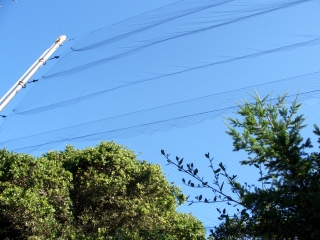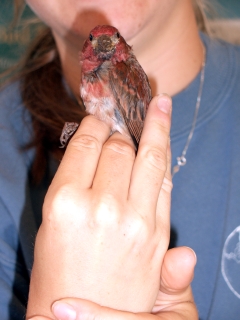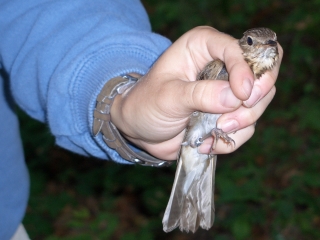Mist Net Morning
Michael:
 We opened the door to the Point Reyes Bird Observatory (PRBO) with nervous excitement and no expectations. A Park Ranger told us that they mist netted here from dawn until about noon. We did not know what mist netting meant. We opened the door to the Point Reyes Bird Observatory (PRBO) with nervous excitement and no expectations. A Park Ranger told us that they mist netted here from dawn until about noon. We did not know what mist netting meant.
For me, the term evoked dreamy fog-like imagery. I imagined the Lady of the Lake rising out of the water to give King Arthur his unbreakable sword, Excalibur. Gab imagined one big volleyball net near the shore, obscured by thick morning pea soup fog.
We knew we had to be at the PRBO early so we woke up at dawn, broke down camp, packed our bags and hiked the mile from the campground to our car. The Observatory was over an hour’s drive away. We arrived just before 8:30 a.m.
We saw no nets on our walk from the small loose gravel parking lot to the pre-fab PRBO office. The office door displayed a listing of the birds captured in the past few days. Exclamation points and smiley faces indicated rare finds. A mist nest run was about to start in five minutes.
I was scared and overwhelmed despite our recent bird watching crash course. The people here are professionals and we are interrupting their workday.
We went in. Two recent female college graduates were sitting behind a large desk. Both greeted us with hellos while they diligently entered information into large notebooks.
 One had something colorful in her left hand. Are my eyes deceiving me? Is that a bird? It can’t be alive. Can it? One had something colorful in her left hand. Are my eyes deceiving me? Is that a bird? It can’t be alive. Can it?
“Do you know what kind of bird this is?” the woman asked Gab as she stretched her left arm our way.
“A grosbeak,” Gab stammered. It was hard to get over the amazement of someone holding a live bird.
“Close,” she reassuringly added while tenderly blowing on the bird’s wing. “It’s a purple finch.” We learned later that the blowing calms the captured birds while keeping them alert.
“Can I take its picture? Is a flash OK?” Gab asked.
“Sure, it’s already pretty nervous. Nothing is going to spook it anymore. We just need to get some info,” she added while placing the bird head first into a small hollowed out cylinder. The bird wiggled its feet while she placed the cylinder onto a scale. Yes, this looked as comical as it sounds. We gawked and giggled. “It’s the best way to weigh it. Do you want to join me on a mist net run?”
Of course we did. A young male PRBO volunteer joined us on the run. Gab asked him, “Why do you volunteer here?”
His earnest response was, of course, “because I love birds.”
We left the office and walked into the dense trees. Oh my heavens, there is the net and oh my, there’s a bird in it. The volunteer quickly noted from over 20 feet away, “It’s a Swainson’s Thrush.”
 And it was. The woman quickly and skillfully removed it from the net and placed it into a small cotton sack. She tied the sack up, handed it to the volunteer, who then took it too the office. And it was. The woman quickly and skillfully removed it from the net and placed it into a small cotton sack. She tied the sack up, handed it to the volunteer, who then took it too the office.
Gab’s mental picture of mist netting was much closer than mine. The nets did resemble volleyball nets and they were placed among the trees, practically invisible when the early morning sun shone through them.
Birds fly into the net and drop into pockets of mesh which hold them until someone comes to retrieve them. Which they do, every 20 minutes. Birds are not harmed in the netting. Not always the case with PRBO workers.
We continued through the trees, moving from net to net, seven in all, peppering our host with questions the entire way. Here are some of the most incredible answers:
“What’s the biggest bird you’ve caught in the nets?” “A Pileated woodpecker (the Woody Woodpecker type). He was very angry and very loud.” We gasped when she told us that he pecked her in the forehead. “It left a mark and hurt a lot, but I’m OK now.”
“Have you caught any raptors?” “Some smaller hawks. You have to carry them much differently.” We guessed correctly that sharp talons and piercing beaks required more than a cloth bag to bring them back to the office.
“Do you ever catch any crows or ravens?” “No, they are much too smart. Even if they flew in, they would probably figure a way out in less than ten seconds.” I silently cheered for my favorite bird. Ah corvus corax, you are too wily!
“Do you catch hummingbirds?” “All the time. You should see how small the bands are.”
Our host was working as an intern at the PRBO. She was a biology major from Illinois but knew very little about bird identification before she began her job here. She learned quickly. Throughout our walk she ID’d birds by their song and lovingly described them all. Her passion and love of birds has grown and warmed our hearts. She never stopped smiling, never complained and seemed so at peace with her life and her work.
During our visit, the mist nets held four birds and one wonderful affirmation. Nature is so wonderful and so calming. We are thankful for places like PRBO that monitor its well-being and invite all of us to participate.
For more information and a better explanation of what the Point Reyes Bird Observatory is all about, go to www.prbo.org.
|